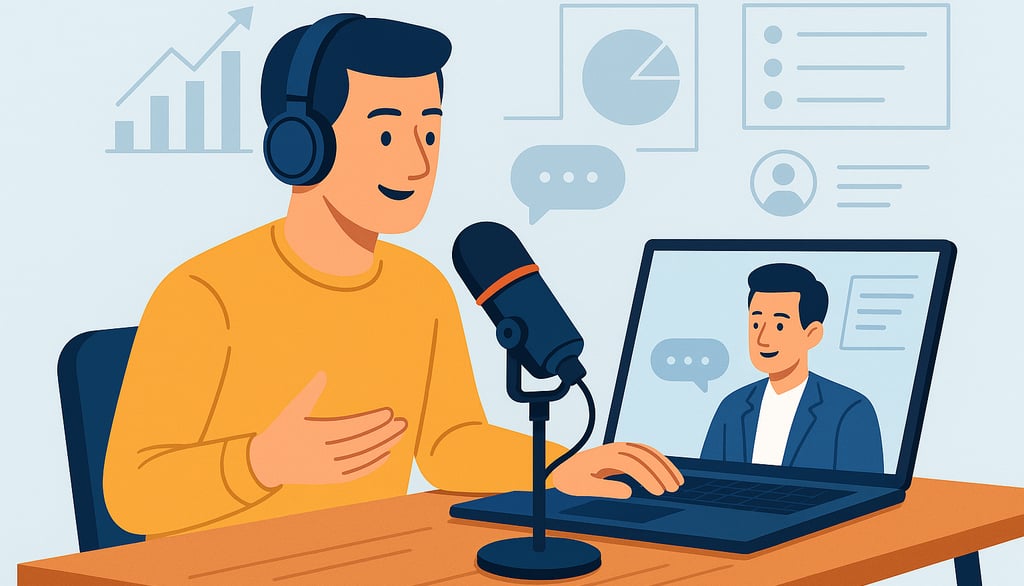Podcasting for Founders: The GTM Channel You're Probably Ignoring
PODCASTS
6/6/20256 min read
Your competitors are chasing clicks. While you could be closing deals, just by having the right conversations."
While founders chase viral LinkedIn posts and compete for expensive keywords, there's a go-to-market channel sitting in plain sight—one that builds genuine relationships, positions you as the industry authority, and fills your pipeline without the content treadmill.
The channel? Strategic podcasting. But not the way most founders think about it.
Why Most Founders Are Getting Podcasting Wrong
Here's the brutal truth: Most founders think podcasting is about downloads and subscriber counts.
That's like thinking sales is about the number of cold calls made.
The reality? It's about relationships. Those vanity metrics don't matter.
Most B2B companies are building podcasts like they're trying to become the next Joe Rogan. They're focused on entertainment over business outcomes, chasing audience size instead of customer quality.
Big mistake.
The Real ROI That'll Change Your Mind
Let's talk numbers. Because if podcasting doesn't drive revenue, it's just another side project you'll abandon in six months.
Here's the simple math that'll blow your mind:
Put out just 2 episodes a month, that’s 24 per year.
Invite 12–15 potential clients or partners as guests.
Even if only 2–3 of them refer or convert, that’s still 2–3 high-value deals from genuine conversations.
Year two? Same playbook, more momentum.
You don’t need a huge audience. You need the right people in the room.
For B2B companies with high client lifetime value, you don't need huge numbers to make this work.
Real case study: Here's what happened when one founder launched their podcast 18 months ago:
Published just over 50 content pieces in 18 months
Featured 35 potential customers as guests
Generated 20+ qualified leads directly from those conversations
Closed 6 deals
Revenue from those: north of $250K
Total investment: ~$25K
ROI: 10x+
But here's the kicker: 67% of their new customers had listened to at least one episode before their first sales call.
One founder surveyed his pipeline. 80% of people who bought from his company had listened to his podcast first. Zero ad spend. Just conversations.
The "Dream 50" Strategy That Actually Works
Here's where podcasting for founders gets interesting.
Instead of trying to reach everyone, focus on your Dream 50. Those are the 50 people you'd love to do business with, partner with, or learn from.
The process is simple:
Identify your Dream 50 clients/partners
Invite them on your podcast
Give them massive value during and after the interview
Build genuine relationships
Let the business flow naturally
The magic happens when you flip the script. Don't have guests on to get clients. Have them on to help them get clients.
The Email Template That Works
Don't pitch your product. Pitch the value you'll provide them. Position them as the expert and your podcast as their platform.
"Hi [Name], I'm launching a podcast for [industry] leaders and would love to feature your expertise on [specific topic they're known for]. The show reaches [relevant audience], and I think your insights on [specific challenge] would be incredibly valuable. Would you be interested in a 30-minute conversation?"
The Strategic Account Play That Closes Whale Deals
Here's your secret weapon for landing major accounts.
You're pursuing a strategic account. During discovery, their CRO mentions they're drowning in AI tools that promise "guaranteed leads in 3 days" but never deliver. They're frustrated, skeptical, and tired of being pitched.
Instead of sending another sales email, you record your next podcast episode about exactly this problem. You dive into why these AI tools fail, what the promises really mean, and why there's no shortcut to building proper brand fundamentals.
Now you send that episode to the CRO with a simple note: "Thought this might resonate with what you mentioned."
What happens next? The CRO forwards it to their CEO, who's been wrestling with the same frustration. Suddenly, you're not just another vendor, you're the person who gets their exact problem.
To the CEO, you're reading their mind. You're human. You have opinions that align with their experience.
You win the deal.
The Follow-Up System That Builds Your Pipeline
The interview is just the beginning. The real relationship building happens after you stop recording.
Here's a CRM approach that'll change how you think about relationship building:
Track how you give to each person:
Have we had them on the podcast?
Have we introduced them to anyone?
Have we sent them a gift?
Have we posted about them on social?
Have we featured them in our newsletter?
It's all about serving first.
The systematic approach:
Within 24 Hours: Send a personal thank you with a specific highlight from your conversation. "Loved your point about [specific insight]."
When the Episode Goes Live: Share the episode with social assets they can use. Make promotion effortless for them.
30 Days Later: Send something valuable: an industry report, an intro to someone in your network, or a resource addressing something they mentioned.
Quarterly Check-ins: Share relevant insights, congratulate them on wins, or send industry intel. Stay visible without being pushy.
This isn't just feel-good advice. One podcast host made 47 strategic introductions between guests. All three responded within half a day, saying, "Sounds great." Result? Three partnerships worth $180,000 ARR.
The Content Strategy That Converts
Here's what separates successful podcasting for founders from hobby shows:
Be selfish with your questions. Ask everything you're curious about. If you're not interested, your audience won't be either.
Focus on your niche. If you're in SaaS, interview SaaS people. If you're in manufacturing, talk manufacturing. The content will naturally be relevant to your ideal customers.
Make it about the guest, not you. Every social post, every blog post, every piece of content should highlight your guest. They'll share it, and their network sees you.
The Content Multiplication Engine
One 45-minute podcast conversation becomes 30+ pieces of content:
1 full podcast episode (audio)
1 YouTube video (video version)
1 long-form blog article (from transcript)
5 shorter topical articles
15 LinkedIn posts
5 YouTube Shorts
10 additional social media posts
Email newsletter content
Sales enablement materials
That's the efficiency most founders dream about.
The Hidden SEO and Discovery Benefits
Here's a bonus most founders don't realize: podcasts are SEO goldmines.
Search Engine Benefits:
Transcripts improve search indexability for high-intent queries
Video podcasts gain visibility across YouTube, LinkedIn, and X.
Search engines now index podcast content directly
Long-form discussions generate backlinks and increase domain authority
Discovery Advantages:
Podcast platforms have their own search algorithms
Cross-platform syndication increases touchpoints
Guest networks amplify your reach organically
Evergreen content continues driving traffic for years
The result? Your podcast becomes an evergreen demand generation asset that works while you sleep.
The Technical Setup (Keep It Simple, Stupid)
Don't overthink the tech. You need:
Recording: Zoom or Riverside.fm for remote interviews
Microphone: Audio-Technica ATR2100x-USB ($69) or Blue Yeti ($100)
Hosting: Anchor.fm (free) or Libsyn ($15/month)
Editing: Descript ($20/month) for AI-powered editing
Your website to embed episodes
Total setup cost: Under $400. Monthly cost: Under $50.
The strategy matters more than the gear. I've seen founders spend months researching soundboards and professional equipment while their competitors are already booking their dream clients through simple Zoom interviews.
What to Measure (Hint: It's Not Downloads)
Track metrics that matter for your business:
Pipeline Metrics:
Website traffic from podcast links
Demo requests from listeners
Qualified leads from guest relationships
Revenue is influenced by podcast content
Relationship Metrics:
Guest response rates to follow-up
Social engagement from your network
Referrals from podcast connections
Partnership opportunities created
Business Impact:
Customer acquisition cost for podcast leads
Deal velocity for podcast-influenced opportunities
Average deal size from podcast relationships
Customer lifetime value of podcast-generated clients
How to Scale Without Burning Out
Here's the reality: podcasting for founders takes work. Some successful hosts do 6-10 interviews per week.
If you're going to do this yourself:
Start with one episode per week
Batch record multiple episodes in one day
Use AI tools for editing and transcription
Create a simple workflow and stick to it
If you have the budget:
Hire someone to handle production
Focus on the relationships and strategy
Let experts handle the technical stuff (Briskfab)
The Batch & Buffer System:
Record 4-6 episodes in one day
Keep 2 episodes always ready to publish
Set a fixed recording day (e.g., every other Friday at 2 PM)
Plan topics with bullet points, not scripts
The 80/20 Rule:
Spend 80% of your time on relationships and strategy
Outsource the 20% (editing, distribution, social posts)
Your 30-Day Launch Timeline
Think podcasting takes months to launch? Think again.
Week 1: Define target audience and content themes
Week 2: Set up basic recording equipment and hosting
Week 3: Record the first 3 episodes with the existing network
Week 4: Edit, publish, and promote episode one
No fancy studio. No expensive equipment. Just strategic conversations with the right people.
The key? Start with your existing network and focus on getting the first episode live, not perfect.
Your Next Steps
Start Conversations, Not Campaigns
Podcasting isn’t about downloads. It’s about access.
Start small. Focus on your Dream 50. Build real relationships.
While others fight for clicks, you’ll be closing deals through conversations.
Podcasting for founders isn’t a side project. It’s your next GTM channel.
🎙️ Ready to launch your B2B podcast the smart way?
BriskFab helps founders turn strategic conversations into revenue. From setup to guest strategy to content repurposing, we’ve got your back.
Let’s build your pipeline, one episode at a time.




